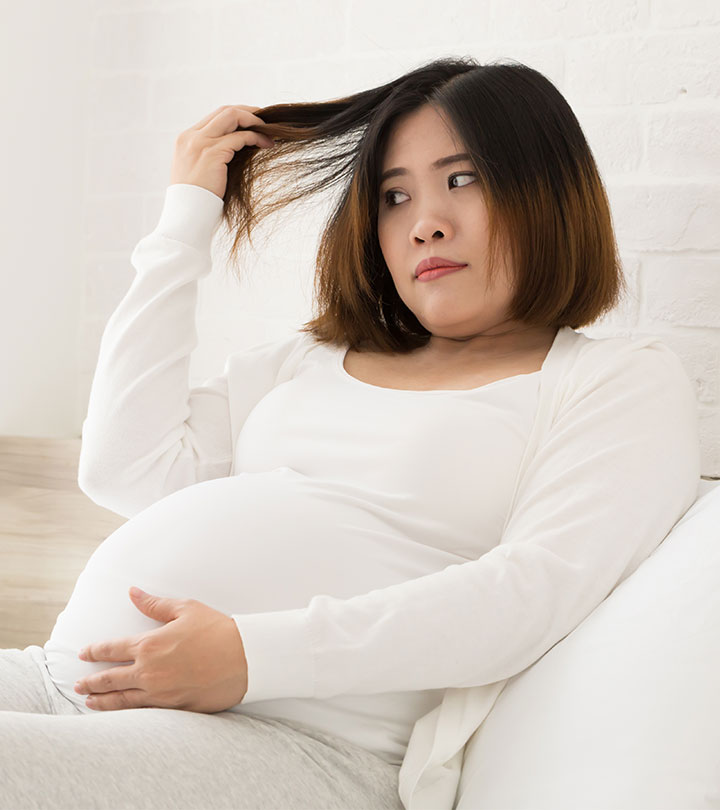Can You Dye Your Hair While Pregnant: Safety and Considerations
During pregnancy, many women wonder whether it’s safe to dye their hair. This article provides insights into the potential risks, precautions, and expert guidance regarding hair dyeing during pregnancy.

Understanding the Concerns: Is Hair Dye Safe During Pregnancy?
Hair dye contains various chemicals that can be absorbed through the scalp. While research is ongoing, there are important factors to consider before deciding to dye your hair while pregnant.
Chemical Exposure
Hair dye products may contain chemicals like ammonia, peroxide, and other additives. These substances can potentially enter the bloodstream and raise concerns about their impact on the developing fetus.
Absorption and Systemic Effects
The scalp has the potential to absorb chemicals from hair dye. These chemicals can then circulate throughout the body, raising questions about whether they could reach the placenta and affect the baby.
Lack of Comprehensive Research
Limited studies specifically address the safety of hair dye during pregnancy. This absence of conclusive evidence makes it important to be cautious and informed when making decisions.
Expert Insights: What Do Healthcare Professionals Say?
To gain a better understanding of the safety considerations, it’s crucial to seek guidance from healthcare professionals with expertise in maternal-fetal health.
Obstetricians and Gynecologists (OB-GYNs)
Many OB-GYNs advise caution during the first trimester when the baby’s organs are forming. They may recommend avoiding hair dye or opting for safer alternatives.
Dermatologists
Dermatologists can provide insights into hair dye components and their potential effects on the skin and scalp. They may suggest patch tests or alternatives like highlights or lowlights.
Hair Care Experts
Stylists and hair care experts can offer suggestions for less risky hair treatments during pregnancy. They may recommend postponing major hair color changes until after childbirth.
Safe Alternatives: Hair Dye Options During Pregnancy
While concerns about traditional hair dye linger, there are alternative approaches to hair coloring that may pose fewer risks during pregnancy.
Ammonia-Free Dyes
Ammonia-free hair dyes are formulated to be gentler on the hair and scalp. These options may reduce the exposure to potentially harmful chemicals.
Vegetable-Based Dyes
Natural and vegetable-based dyes, such as henna, may be a safer choice for pregnant individuals. These dyes are derived from plant sources and are often considered a more natural option.
Highlights and Lowlights
Instead of full hair color changes, consider highlights or lowlights that don’t come into direct contact with the scalp. This can reduce chemical exposure and minimize risks.
Precautions to Take When Dyeing Hair During Pregnancy
If you decide to dye your hair while pregnant, taking specific precautions can help minimize potential risks.
Choose Well-Ventilated Spaces
If you opt for traditional hair dye, ensure that you’re in a well-ventilated area to reduce the inhalation of fumes.
Perform a Patch Test
Before applying any dye, do a patch test to check for potential skin reactions or allergies.
Limit Exposure
If you’re concerned about chemical exposure, consider extending the time between dyeing sessions or opting for low-risk alternatives.
The Final Verdict: Making an Informed Decision
Ultimately, the decision to dye your hair while pregnant rests on weighing the potential risks against your personal comfort level and expert advice.
Consult Your Healthcare Provider
Before making any decisions, consult your healthcare provider. They can assess your individual health and provide tailored recommendations.
Prioritize Safety
If you choose to dye your hair, prioritize safety. Opt for alternatives that minimize chemical exposure and take precautions to protect your well-being.
Embrace Natural Beauty
Pregnancy is a time of change and growth. Embrace the natural beauty of your changing body and consider alternatives that align with your well-being.
Frequently Asked Questions (FAQs) About Dyeing Hair During Pregnancy
Q1: Is it safe to dye my hair while pregnant?
The safety of hair dye during pregnancy is still debated. Consider safer alternatives and consult your healthcare provider for personalized advice.
Q2: Are ammonia-free dyes safe for pregnant women?
Ammonia-free dyes are generally considered gentler, but always perform a patch test and consult your doctor before using any hair dye.
Q3: Can I use henna hair dye during pregnancy?
Natural henna dyes, derived from plants, are often considered safer. However, consult your healthcare provider before using any hair dye.
Q4: What precautions should I take when dyeing my hair while pregnant?
Opt for well-ventilated spaces, perform a patch test, and limit exposure. Consider low-risk alternatives to minimize potential risks.
Q5: Can hair dye fumes harm my baby?
While the risks are uncertain, using hair dye in well-ventilated areas and wearing protective gear can help reduce potential harm.
Q6: When is the best time to dye hair during pregnancy?
If you choose to dye your hair, many experts suggest waiting until after the first trimester when the baby’s organs are forming.
Q7: Are there natural ways to color hair during pregnancy?
Yes, alternatives like vegetable-based dyes and highlights/lowlights can be safer options with reduced chemical exposure.
Q8: Should I consult my healthcare provider before dyeing my hair?
Absolutely. Your healthcare provider can offer personalized advice based on your health and the stage of your pregnancy.
Q9: Can hair dye cause allergic reactions during pregnancy?
Yes, some individuals may develop skin reactions or allergies. Perform a patch test and consult your doctor before using any hair dye.
Q10: Is embracing my natural hair color a better option during pregnancy?
Embracing your natural beauty is a wonderful choice. Prioritize your well-being and consider low-risk alternatives if you decide to dye your hair.
Conclusion
While the question of dyeing hair during pregnancy is complex, it underscores the importance of informed choices. Prioritizing your health and the health of your baby is paramount. By understanding the potential risks, exploring safer alternatives, and seeking expert guidance, you can make a decision that aligns with your well-being while enjoying this transformative journey.




